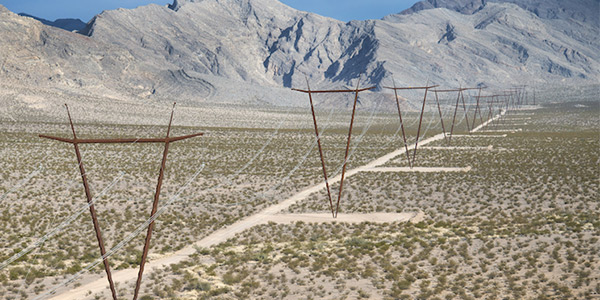Nevada lawmakers are planning to introduce an array of clean energy bills during the 2021 legislative session, including a measure that could pave the way for a massive expansion of electric transmission in the state.
Sen. Chris Brooks (D) is crafting a bill that he says would incentivize and prioritize new electric transmission in the state, potentially creating about $10 billion worth of investment in clean energy.
“I’m really looking forward to being able to expand the clean energy opportunities in the state of Nevada through transmission investment,” Brooks said during a meeting this month hosted by the Nevada Conservation League. “I think it’s long overdue.”
Brooks told RTO Insider that he’s still working with stakeholders to hammer out details of the bill, which had not yet been introduced. While specifics of the proposal were not yet available, he said the incentives are not likely to be financial. Instead, the bill would provide ways to facilitate new transmission projects.
Transmission won’t be the only focus of Brooks’ omnibus legislation, which the senator informally called his “big energy bill.” Other components will include plans for electric vehicle charging infrastructure and measures that would create rooftop solar energy opportunities for renters and multifamily housing residents.
Another piece of the legislation aims to align electric utilities’ integrated resource planning process with the state’s carbon reduction goals.
“It won’t just be the renewable portfolio standard anymore that is guiding how we invest in clean energy in the state,” Brooks said. “We’re actually going to use the carbon reduction goals of the state to guide clean energy investments.”
The Nevada legislature, which meets every other year, convened on Feb. 1 for a session that will run through May 31. Brooks and other lawmakers outlined their clean energy plans during a Nevada Conservation League meeting on Feb. 1, held via Zoom.
Although lawmakers are grappling with the COVID-19 pandemic’s economic impacts, they said they are still determined to make progress toward climate objectives this session. Nevada has set a goal of net-zero greenhouse gas emissions by 2050.
“Even in the midst of a pandemic, even in the midst of a massive economic downturn, we can take advantage of this legislative session to move the ball forward on climate and also create jobs — good-paying jobs — and tax revenues,” Brooks said. “We can achieve all of the goals at the same time.”
‘Classic Car’ Loophole
In addition to Brooks’ energy bill, Assemblyman Howard Watts (D) is planning a bill to reduce vehicle emissions by closing what’s been called the state’s “classic car” loophole.
The state allows cars that are 20 years or older to be registered as classic vehicles, which exempts them from smog checks. Critics point to cars that many people wouldn’t consider a classic — such as a 2000 Honda Accord — which may qualify for the exemption and remain on the roads as gross polluters.
Watts said his bill would not only close the classic car loophole but also increase smog check fees to raise funds for a variety of programs. Those would include assistance to low-income residents to repair their cars to meet emission standards or even to buy a new electric vehicle.
Chispa Nevada, a Las Vegas-based environmental conservation organization, has championed the proposal.
“We like the idea of creating/identifying funds for programs that help low-income customers repair their polluting vehicles or replacing them with cleaner versions like … low- or zero-emission cars,” Program Director Rudy Zamora said. “Oftentimes when we talk about electric vehicles, we forget about our communities — low-income communities, communities of color.”
Natural Gas Under Scrutiny
The Natural Resources Defense Council (NRDC) is also crafting legislation for the 2021 session.
One proposed bill calls for increased scrutiny of investments in natural gas infrastructure.
“As Nevadans use less methane gas in homes and businesses … gas utilities are at risk of wasting ratepayer money on unnecessary construction projects,” said Dylan Sullivan, a senior scientist with the NRDC. Sullivan said Assemblywoman Lesley Cohen (D), had agreed to sponsor the bill.
NRDC’s second piece of proposed legislation would focus on energy efficiency programs. Although NV Energy runs a number of such programs, Sullivan said the utility is not doing enough. The bill would make some energy-savings targets mandatory and increase targets for programs geared toward low-income residents. The bill would also give regulators the option to designate a third party to run the programs.
Two bills are likely to come out of the Legislative Committee on Energy, a panel of six lawmakers that meets between legislative sessions to discuss energy matters. Assemblywoman Daniele Monroe-Moreno (D) chairs the committee, and Brooks is vice chair.
One of the committee’s proposals would amend the Nevada constitution to allow proceeds from gas taxes or vehicle license and registration fees to be used for transit projects. Currently, the use of those funds is restricted to the construction, maintenance, operation and repair of public highways.
The second proposal would establish a working group to develop preliminary plans for a sustainable system of transportation funding. The group would study topics including the needs of bicyclists, pedestrians and transit users, as well as ways to reduce transportation-related GHG emissions.






